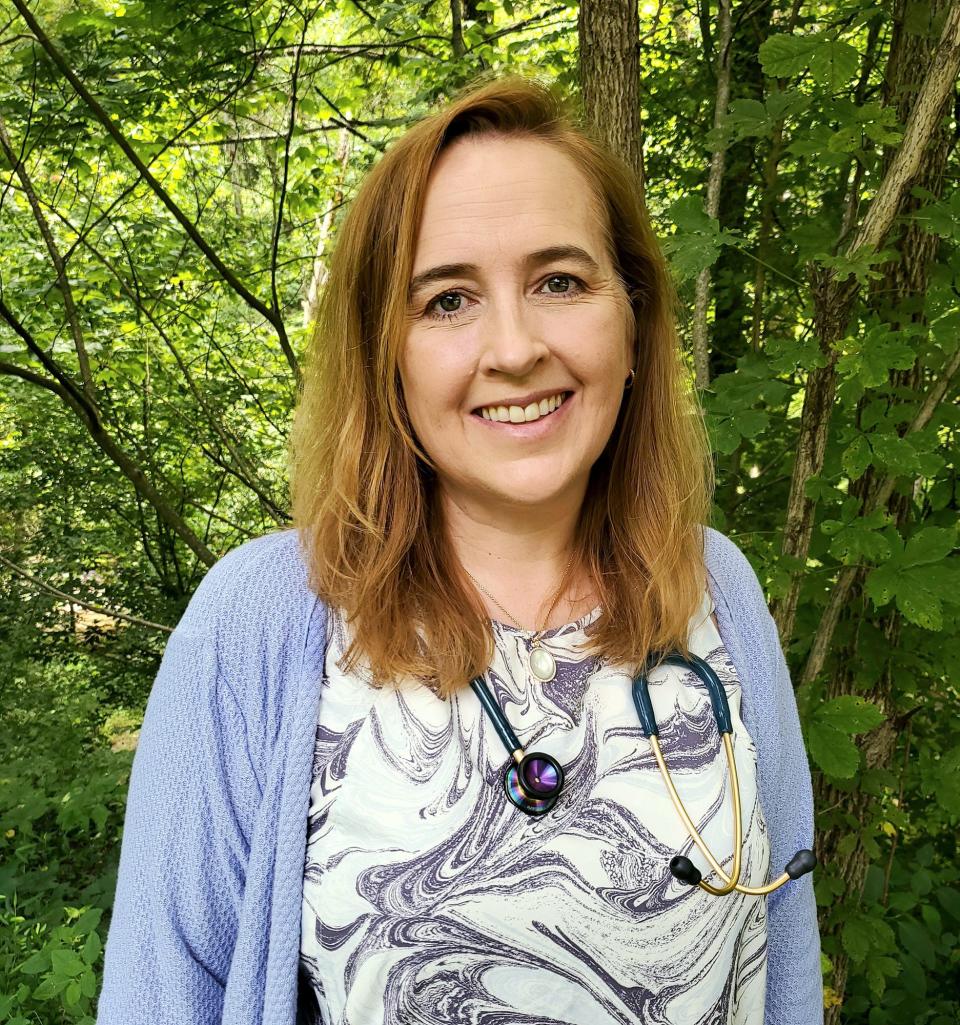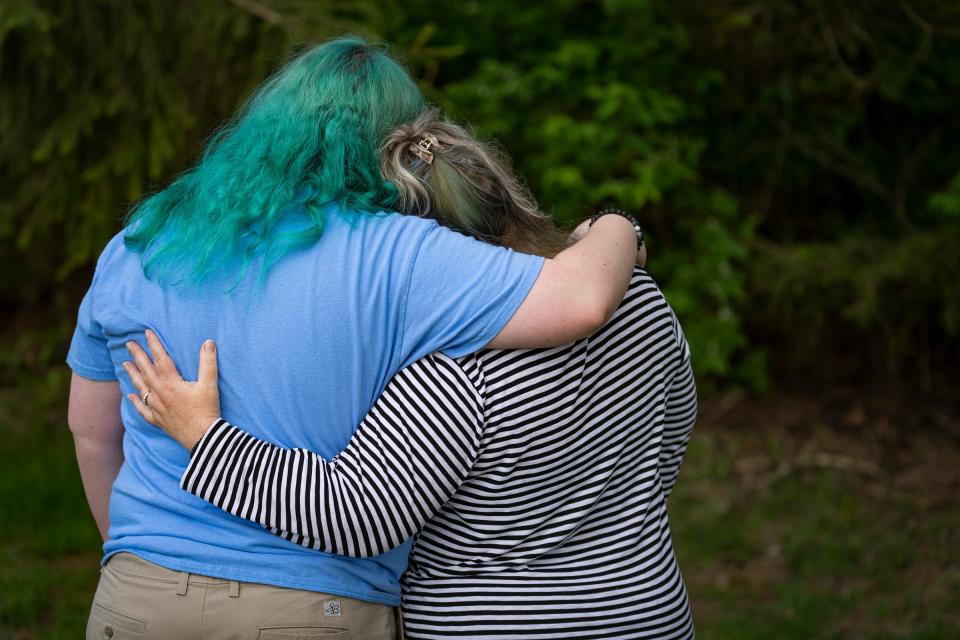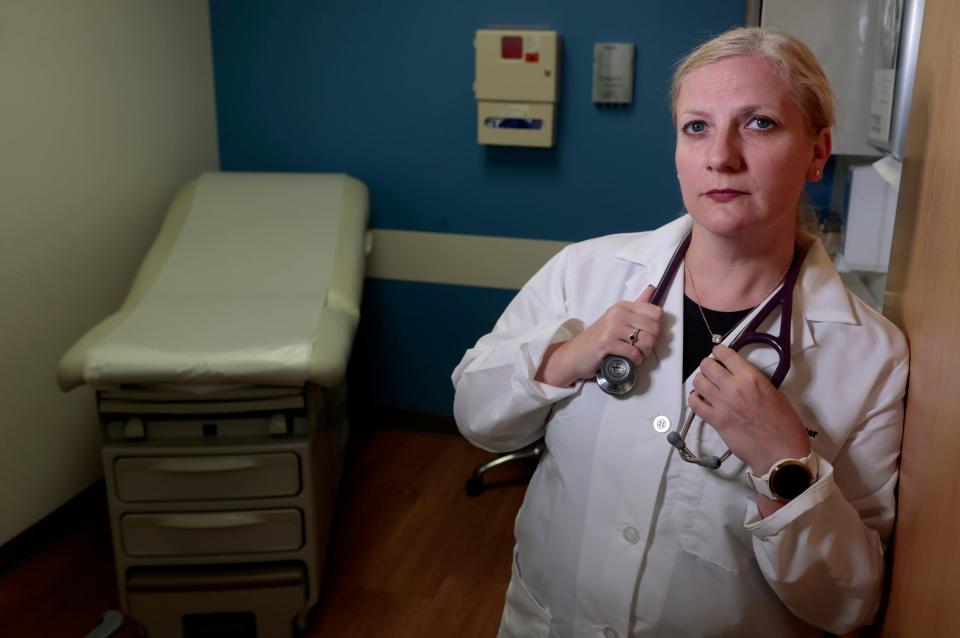Without enough psychiatrists, pediatricians have become front-line mental health workers
In the face of a youth mental health crisis, adolescents are struggling to access care, a new report finds. A survey of nearly 2,800 patients revealed that 69% of adolescents who sought mental health or substance use care between 2019 and 2022 did not receive it on at least one occasion.
With so few pediatric psychiatrists and mental health professionals available, primary care providers are increasingly trying to fill the gap, offering front-line mental health care they are mastering on the job.
“We prescribed so much more psychotropic medication than I've ever prescribed in my career just within the last five years,” said Dr. Stephanie Goodson, a pediatrician with Michigan Medicine who also consults with the American Academy of Pediatrics on peer-to-peer training. “I've just had to learn how to feel more comfortable with it and how to handle the follow-up with it. And I'm seeing that more commonly done by all primary care physicians that I've talked to.”

Mental, emotional and behavioral disorders have become the most common illnesses affecting children today, with about 20% of young people experiencing a diagnosable mental health disorder.
Rates of mental health disorders among youths have been climbing swiftly; 30% more children received mental health services in 2020 than in 2015, according to national data. But those statistics make no mention of how many kids and teens tried to get help and couldn’t.
The dire need for adolescent mental health services
By the numbers, anyone would be alarmed.
The Centers for Disease Control and Prevention reported this year that teen girls are experiencing record-high levels of violence, sadness and suicide risk. As of 2021, the last year for which data is available, more than half of them persistently felt sad or hopeless — nearly a 60% increase and the highest level reported over the past decade.
LGBTQ+ teens are experiencing “ongoing and extreme distress,” the CDC reported, with one in five of them having attempted suicide in the past year.

Of the young people who received a valid mental health diagnosis in 2020, 70% of them were deemed to be at risk for a serious emotional disturbance: a disorder that substantially interferes with their ability to function in family, school or community activities.
“Probably the majority of mental health and substance use disorders start in people under 18,” said Dr. Henry Harbin, a co-author of the report and a psychiatrist with more than four decades of experience. “And we know a lot of these people don’t get screened and identified and referred to care.”
A Citizens Research Council of Michigan report found in 2021 that “Among Michigan’s youth experiencing any mental illness, more than a third are not receiving care (with even larger gaps for substance use disorders).”
Child and adolescent psychiatrists are 'like unicorns now'
Dr. Rachel Klamo is a family medicine doctor with Ascension in Oxford. She said that after COVID-19 and two school shootings, up to half her day is spent dealing with patients’ behavioral health needs. That's despite the fact that only a small fraction of her training was devoted to learning about mental illness and how to treat it.

“You open up your schedule and it’s like, anxiety, anxiety, attention deficit issue, depression worsening, suicidal thoughts … There were times when I felt like I don’t see this day as really that different than what a psychiatrist’s schedule would look like.”
She’s far from alone: Klamo estimates that up to 90% of patients with mental health problems are being managed by their family doctor, internist or pediatrician.
"It's not surprising that primary care doctors are the first to treat mental health or substance use issues, because that's where it should start," said Kevin Fischer, executive director of Michigan's chapter of the National Alliance on Mental Illness. "The key issue here is not only the shortage of behavioral health care professionals, but specifically adolescent or child psychiatrists: They're like unicorns now."
According to the report, which was produced by the Bowman Family Foundation based on national surveys conducted by the independent research institute NORC at the University of Chicago, this approach gets very lopsided reviews; 98% of adolescent patients who received mental health or substance use care from physical health providers felt that they needed additional help from a mental health or substance use specialist.
“I just think it’s a limitation of time,” said Goodson. “I’m seeing a patient in a 15-minute time window and a psychiatrist might have an hour.”
“I try to do therapy in the room, but I’m not a therapist,” she said. “I’m a pediatrician.”
It’s harder and more expensive for kids compared with adults
One key finding of the report is that while children had better access to physical health care than adults, their ability to access mental health and substance use care was worse.
While about one-third of adults couldn’t get physical health care and 57% couldn’t get mental or substance use health care at least once over the past year, 17% of children missed out on physical health care and 69% couldn’t access mental health or substance use care.
More: Michigan hospitals unite to seek, address health inequities in care for kids
When children were able to access mental health or substance use care, it tended to cost more than for adult patients. A 2019 report found that a behavioral health care office visit for a child was 10 times more likely to be out of network than a primary care visit — twice the disparity seen for adults. That translates into bigger copays and higher deductibles.
Why aren’t kids getting care?
Harbin says it takes an average of 10 years from the time a person with a mental health or substance use disorder first has symptoms to getting diagnosed and treated.
“Can you imagine if the president of the United States said, ‘Let me give you an update on COVID now. It’s going to take us about 10 years from the time that you have a cough and a fever before you even have a test, much less treatment?' ” said Harbin. "But that’s the state of the care in the U.S. for this.”
Though not specific to children, the Bowman Family Foundation report found that 40% of patients using health insurance who received outpatient care had to contact four or more in-network providers before they were able to get an appointment with one.
Goodson has witnessed these hurdles for her younger patients. In her experience, she says, getting help often requires more than four phone calls.
A 2023 Senate Committee study found that calls to mental health care providers who accepted Medicare Advantage successfully resulted in appointments just 18% of the time. More than 80% of offices were either unreachable, not accepting new patients, or not in network; a third of them had inaccurate or nonworking numbers or never returned a call.
What happens when a child can’t access mental health care
Sometimes a family has the time, resources and stamina to continue searching for someone who can help. Sometimes that needed appointment is just a few more phone calls away, or a slightly farther drive.
But for adolescents whose caregivers believe that mental illness is a weakness or something they’ll snap out of, or those whose parents just don’t have the ability to keep banging on doors to get assistance, being unable to get mental health or substance use care one time can be enough to keep them out of treatment for years.
“When you're going through a mental health crisis or challenge, the act of calling around to try to find someone to help you is kind of a ridiculous way to approach it, and it's really hard for someone who's struggling,” Klamo said. “Most of these people either never end up seeking care, or they delay or they just ultimately suffer more and go untreated.”
If they do manage to get care, it may be once they need a higher level of care, like a hospital, emergency room or even an adolescent correctional facility, says Harbin.
More: State puts $8 million into SOS effort to save Michigan moms and babies
Even being in crisis sometimes isn’t enough to get care. With fewer than 400 pediatric psychiatric beds in the state, Goodson says she has seen plenty of parents just take their kids home rather than wait in the emergency department for days. “Then they get lost to follow-up,” she said. “They’re not going to get the care that they really need.”
Michigan health systems have found success with collaborative care models
The challenges of accessing psychiatrists and other mental health professionals are among reasons the bulk of the population receives mental health and substance use care from a primary care provider. Given that reality, making sure primary care providers are equipped to deliver that care is essential. And the report authors suggest it can be done.
One of their key recommendations is to integrate mental health services into primary care using clinically effective methods such as collaborative care models.
“In that model, we’ve seen very high satisfaction with primary care and good outcomes, in fact, almost equivalent outcomes to what you would get if you were seeing a psychiatrist or psychologist separately,” said Harbin. He said Blue Cross of Michigan in particular has done a lot in this state to provide technical support and reimbursement to physicians using a collaborative care model.
Michigan Medicine, where Goodson practices, says the synergy of the collaborative care model allows for more regular and longer meetings for patients. Plus, she can follow up after patient visits to make sure they connected with someone, or compare notes about whether an adolescent should begin or switch medications.
“It’s just a much better way of handling mental health,” Goodson said.
The report also recommended expanding mental health and substance use networks, and getting insurance companies to cover and reimburse for video and audio-only mental health services at parity with in-person care, though Harbin pointed out telehealth isn't always a great approach for children.
It also called on the government to fully comply with and enforce federal and state parity laws put in place to address the large discrepancy between patients' ability to access and afford mental health and substance use care and physical health care.
Phone-a-friend for physicians
For young people and caregivers in need of behavioral health or substance use care, Fischer says resources are available in the community, but people rarely know how to access them.
He pointed to Michigan's several dozen Certified Community Behavioral Heath Clinics, piloted here and now a national model with permanent federal funding. These clinics are designed to provide coordinated comprehensive mental health care for people of all ages no matter their ability to pay or their diagnosis. "It is the best-kept secret probably in the country, and it should not be," Fischer said.
The Michigan Child Collaborative Care Program, which is part of the Michigan Medicine Department of Psychiatry and is funded by the Michigan Department of Health and Human Services, is a resource for physicians. It offers training and serves as a phone-an-expert service for primary care providers who are managing patients with behavioral health issues.
Goodson says she has used them to ask about difficult medication prescribing practices. Klamo calls it a “best practice that’s probably underutilized.”
Especially where physicians may feel confident managing adult behavioral health but aren't sure how to treat an 8-, 9- or 10-year-old, Klamo said, “It’s really helping to fill a gap in a group where some primary care docs may not feel as comfortable.”
Jennifer Brookland covers child welfare for the Detroit Free Press in partnership with Report for America. Reach her at jbrookland@freepress.com.
This article originally appeared on Detroit Free Press: Michigan pediatricians have become front-line mental health workers

